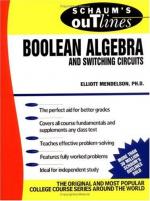|
This section contains 1,012 words (approx. 4 pages at 300 words per page) |

|
Boolean algebra, sometimes referred to as the algebra of logic, is a two-valued system of algebra that represents logical relationships and operations. English logician and mathematician George Boole, the first to apply these algebraic techniques to the logic process, contended that any logical statement could be assigned a binary value, such as "true/false" or "yes/no." In 1854 Boole wrote An Investigation of the Laws of Thought, in which he discussed ways of reducing logical relationships to simple statements of equality, inequality, inclusion, and exclusion. Boole then showed ways to express these statements symbolically using a binary (two-valued) code, and stated the algebraic rules that governed these logical relationships. This system of mathematical logic came to be known as Boolean algebra.
It was in 1937 that Claude Shannon, then a graduate student at the Massachusetts Institute of Technology, first discussed the connection between electronic circuits and Boolean...
|
This section contains 1,012 words (approx. 4 pages at 300 words per page) |

|


